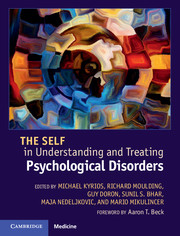Book contents
- The Self in Understanding and Treating Psychological Disorders
- The Self in Understanding and Treating Psychological Disorders
- Copyright page
- Contents
- Contributors
- Foreword
- Acknowledgments
- Section 1 Introduction and concepts
- Section 2 The self in treatment frameworks
- Section 3 The self in specific psychological disorders
- Section 4 Conclusions and future directions
- 23 Future directions in examining the self in psychological disorders
- Index
- References
23 - Future directions in examining the self in psychological disorders
from Section 4 - Conclusions and future directions
Published online by Cambridge University Press: 05 February 2016
- The Self in Understanding and Treating Psychological Disorders
- The Self in Understanding and Treating Psychological Disorders
- Copyright page
- Contents
- Contributors
- Foreword
- Acknowledgments
- Section 1 Introduction and concepts
- Section 2 The self in treatment frameworks
- Section 3 The self in specific psychological disorders
- Section 4 Conclusions and future directions
- 23 Future directions in examining the self in psychological disorders
- Index
- References
- Type
- Chapter
- Information
- The Self in Understanding and Treating Psychological Disorders , pp. 233 - 236Publisher: Cambridge University PressPrint publication year: 2016



